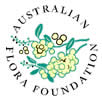Summary of a publication reporting research funded in part by the Australian Flora Foundation
A.K. Ahmed, K.A. Johnson, M.D. Burchett and B.J.Kenny
Department of Environmental Sciences, University of Technology Sydney
Sydney 2065 Australia
Seed Science & Technology 34: 33-45 (2006).
Poor germination is considered a barrier to the horticultural development of a commercially significant Australian native edible species, Solanum centrale JM Black (bush tomato). Seed viability and the effects of heat, smoke, soaking, leaching, temperature, scarification and NaCl salinity on germination rates and percentages were investigated. Seed dormancy is imposed by the seed coat; once scarified, germination of two see lots approached the viability levels determined through tetrazolium testing. Germination did not differ at temperatures of 12, 20 or 28°C, indicating that there is no seasonal temperature preference . Soaking and leaching promoted germination in one each out of five experiments, while heat had no effect. Smoke enhanced the total germination of three of the six provenances tested, once dormancy was broken by seed coat scarification. The seeds showed considerable salinity tolerance, germinating in solutions of up to 22mM NaCl, although 0 and 25mM NaCl produced higher total germination.
